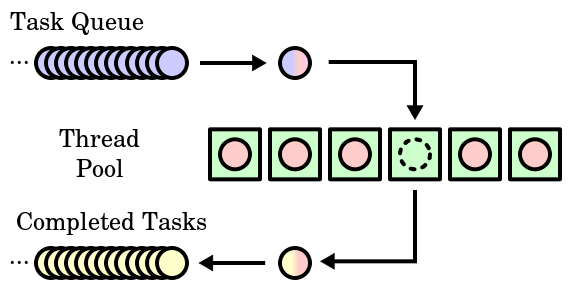C 的 Thread Pool 筆記
最近被丟到 FreeBSD 跟 C 的世界裡面,沒有 Scala 的 Actor 可以用。 所以只好參考別人的 Thread Pool 來看一下,在 C 的世界裡面 Thread Pool 是怎麼實作的。
首先先去 StackOverFlow 中尋找是否有人問過類似的問題
Existing threadpool C implementation
裡面有提到幾個 C Thread Pool 的實作範例與可參考的文件
我這邊是直接應該是會以 threadpool-mbrossard 作為第一個研究的版本,因為他一直有在維護。 而且作者就是 Existing threadpool C implementation 的發文者,感覺他還蠻熱心的。
##threadpool A simple C thread pool implementation
Currently, the implementation:
- Works with pthreads only, but API is intentionally opaque to allow other implementations (Windows for instance).
- Starts all threads on creation of the thread pool.
- Reserves one task for signaling the queue is full.
- Stops and joins all worker threads on destroy.
from wikipedia
##Thread Pool 的資料結構 首先 Thread Pool 要有的東西就是 job 或者是 task 讓 Thread 知道他們要做什麼事情。
typedef struct {
void (*function)(void *);
void *argument;
} threadpool_task_t;
所以只要有一個資料結構紀錄要執行的 function pointer 與要傳遞的參數即可。 接下來就是 Thread Pool 本身,他必須存放所有的 Thread 與 Job Queue
struct threadpool_t {
pthread_mutex_t lock;
pthread_cond_t notify;
pthread_t *threads;
threadpool_task_t *queue;
int thread_count;
int queue_size;
int head;
int tail;
int count;
int shutdown;
int started;
};
這邊他使用了一個 pthread_t 的 pointer 來紀錄所有的 Thread,簡單來說就是一個 pthread_t 的 array,而 head, tail 就是紀錄 array 的 offset。 threadpool_task_t 也是一樣的原理,真是出乎意料的簡單。
##ThreadPool 的建立與工作的執行 再來就是 Thread Pool 的建立,由於剛剛提到的他其實是使用一個 pthread array 與一個 job array 來存放所有的 thread 與 jobs。 因此需要在一開始的時候就決定 Thread Pool 與 Jobs 的最大數量。
/* Allocate thread and task queue */
pool->threads = (pthread_t *) malloc(sizeof(pthread_t) * thread_count);
pool->queue = (threadpool_task_t *) malloc(sizeof(threadpool_task_t) * queue_size);
而每個 Thread 要執行的 Function 是
static void *threadpool_thread(void *threadpool)
{
threadpool_t *pool = (threadpool_t *)threadpool;
threadpool_task_t task;
for(;;) {
/* Lock must be taken to wait on conditional variable */
pthread_mutex_lock(&(pool->lock));
/* Wait on condition variable, check for spurious wakeups.
When returning from pthread_cond_wait(), we own the lock. */
while((pool->count == 0) && (!pool->shutdown)) {
pthread_cond_wait(&(pool->notify), &(pool->lock));
}
if((pool->shutdown == immediate_shutdown) ||
((pool->shutdown == graceful_shutdown) &&
(pool->count == 0))) {
break;
}
/* Grab our task */
task.function = pool->queue[pool->head].function;
task.argument = pool->queue[pool->head].argument;
pool->head += 1;
pool->head = (pool->head == pool->queue_size) ? 0 : pool->head;
pool->count -= 1;
/* Unlock */
pthread_mutex_unlock(&(pool->lock));
/* Get to work */
(*(task.function))(task.argument);
}
pool->started--;
pthread_mutex_unlock(&(pool->lock));
pthread_exit(NULL);
return(NULL);
}
在 for(;;) 裡面,Thread 第一件要做的事情就是去搶奪 pool 的 lock,當搶到 lock 的 Thread 發現沒有工作可以做的時候, 就會執行 pthread_cond_wait 來等待通知。這時候 pool->lock 會被 Unlock,因此這時候其他 Thread 也可以進來這個區域。 所以在完全沒有工作的情況下,所有的 Thread 都會在這邊 Waiting。
當 Thread 被透過 pthread_cond_signal 喚醒的時候,該 Thread 就會重新取得 pool->lock。 這時他就可以安心的取出 queue 中的 task,等待取出完畢之後,再 unlock 讓其他被喚醒的 Thread 也可以去取得 Task。
之後就是執行 task 中的 function pointer 做該做的工作。
##ThreadPool 的 destory destory 就更簡單了,只要使用 pthread_cond_broadcast 通知所有的 Thread 起來,由於 shoutdown 的確認會在執行工作之前。 所以該 thread 就會離開執行工作的迴圈,並且結束。
其實寫這篇筆記應該只是想貼這個
